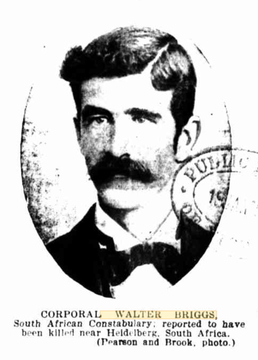
BRIGGS, Walter Clement
| Service Number: | 50 |
|---|---|
| Enlisted: | Not yet discovered |
| Last Rank: | Not yet discovered |
| Last Unit: | South African Constabulary |
| Born: | Cudgewa, Victoria, Australia, 6 April 1870 |
| Home Town: | Cudgewa, Towong, Victoria |
| Schooling: | Not yet discovered |
| Occupation: | Not yet discovered |
| Died: | Killed In Action, De Hoek (Heidelberg), South Africa , 30 August 1901, aged 31 years |
| Cemetery: | Not yet discovered |
| Memorials: | Ballarat Boer War Memorial (Queen Victoria Square), Cudgewa Boer War Memorial |
Boer War Service
| Date unknown: | Involvement 50, South African Constabulary |
|---|
Help us honour Walter Clement Briggs's service by contributing information, stories, and images so that they can be preserved for future generations.
Add my storyBiography contributed by Stephen Learmonth
Walter Clement Briggs was born on the 6th of April 1870, at Cudgewa, Victoria. His father, James, was 39 at the time, while his mother Ellenor (née McIntyre), was 36. Walter was to become one of twelve children in the Briggs family.
Walter was a big man, over 6 feet in height, and had been given the nickname "Dot". In February 1900 he had driven his brother and other successful volunteers for the Fourth Victorian Contingent, from Cudgewa to the Tallangatta Railway station in his "express wagon" after a farewell was attended by over 200 people. In late 1900, he volunteered for the Fifth Victorian Mounted Rifles with his friend, Robert Carlisle, from Granya. Carlisle was accepted however Walter was rejected because he was overweight.
Not letting the issue of his weight hold him back, he decided to pay for his own passage to South Africa and enlisted in the South African Constabulary (SAC), one of the imperial units being established at the time, on the 21st of December 1900. His records indicate that he was able to ride and shoot although his appearance was “stoutly built”. He was allocated the Service Number C50 and was informed that his wage would be 5 Shillings per day.
The South African Constabulary was created in August of 1900. Its purpose was to be a paramilitary force to police the conquered Boer republics. However it was unable to take up its policing duties due to the nature of the war. It was therefore employed as a military force and was constantly engaged in field operations and on blockhouse lines. Walter was killed in action at De Hoel, South Africa on the 30th of August 1901.
James received a letter in early October of 1901 from Walter’s commanding officer. It was published in the17th of October edition of the Corryong Courier.
“Heidelberg, Transvaal, 31/8/01.- To J. Briggs Esq., Spring Bank, Cudgewa, Victoria, Australia. - Dear Sir,- I deeply regret that it is my duty to tell you that your son, Corporal W.C. Briggs, of my troop, was shot dead yesterday morning while doing his duty. He was doing brilliant and useful scouting at the time. He was shot through the femoral artery, and must have died a painless death in a few minutes. He had a soldier’s funeral at 8 p.m. last night, and we buried him under a tree on a farm named De Hork near Heidelberg. His comrades will see that his grave is well cared for, and I will, if possible, send you a photo of it in the near future. Your son was a great favorite with all ranks, and was a trustworthy and good soldier. A few little things such as a pocket-book, etc., I will forward to you, also the money that may come in by the sale of his kit and effects. I sympathize with you in the loss of a son, whom you should always be proud of. - Yours sincerely, A. Essex Capell, Captain Number 5 troop, C Division, South African Constabulary.”
The Ovens and Murray Advertiser edition on Saturday the 19th of October 1901 included an article on the memorial service held in Cudgewa for Walter.
"The Norie Memorial Church at Cudgewa was (says our Corryong contemporary) filled by a large congregation on Sunday when the Rev. Mr. Lahore preached a memorial service to Corporal W. C. Briggs (son of Mr. J. Briggs, of Cudgewa) who was killed while on active service in South Africa recently. The pulpit was suitably draped for the occasion, the black being relieved by the red, white, and blue of a large Union Jack, which was arranged across the front."
During the 1960’s his remains were reinterred at Standerton. For his service during the Second Boer War, Walter was awarded the South African Medal with the Cape Colony, Orange Free State and Transvaal clasps. Walter is remembered on the Australian War Memorial Commemorative Roll, the Ballarat Boer War Memorial and the Cudgewa Boer War Memorial.











